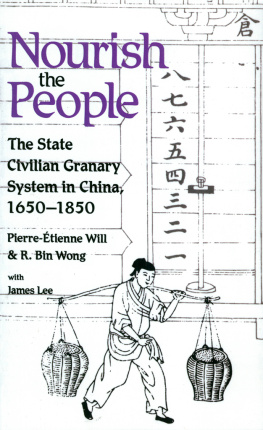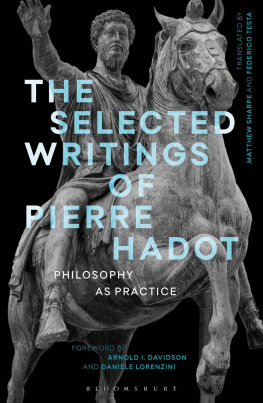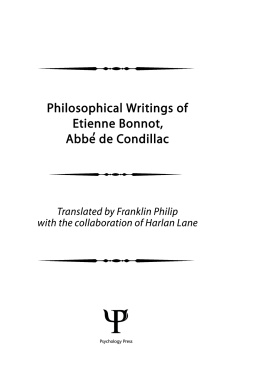Pierre-Étienne Will - Nourish the People
Here you can read online Pierre-Étienne Will - Nourish the People full text of the book (entire story) in english for free. Download pdf and epub, get meaning, cover and reviews about this ebook. year: 1991, publisher: Kenneth G. Lieberthal and Richard H. Rogel Center for Chinese Studies, genre: Politics. Description of the work, (preface) as well as reviews are available. Best literature library LitArk.com created for fans of good reading and offers a wide selection of genres:
Romance novel
Science fiction
Adventure
Detective
Science
History
Home and family
Prose
Art
Politics
Computer
Non-fiction
Religion
Business
Children
Humor
Choose a favorite category and find really read worthwhile books. Enjoy immersion in the world of imagination, feel the emotions of the characters or learn something new for yourself, make an fascinating discovery.
- Book:Nourish the People
- Author:
- Publisher:Kenneth G. Lieberthal and Richard H. Rogel Center for Chinese Studies
- Genre:
- Year:1991
- Rating:5 / 5
- Favourites:Add to favourites
- Your mark:
- 100
- 1
- 2
- 3
- 4
- 5
Nourish the People: summary, description and annotation
We offer to read an annotation, description, summary or preface (depends on what the author of the book "Nourish the People" wrote himself). If you haven't found the necessary information about the book — write in the comments, we will try to find it.
Nourish the People — read online for free the complete book (whole text) full work
Below is the text of the book, divided by pages. System saving the place of the last page read, allows you to conveniently read the book "Nourish the People" online for free, without having to search again every time where you left off. Put a bookmark, and you can go to the page where you finished reading at any time.
Font size:
Interval:
Bookmark:

Nourish the People
Nourish the People
The State Civilian Granary System in China, 16501850
Plerre-tienne Will
& R. Bin Wong
with
James Lee
contributions by
Jean Oi
Peter Perdue
Open access edition funded by the National Endowment for the Humanities/Andrew W. Mellon Foundation Humanities Open Book Program.
Copyright 1991
Center for Chinese Studies
The University of Michigan
Center for Chinese Studies Publications
104 Lane Hall
The University of Michigan
Ann Arbor, MI 48109
Cover design: Heidi Hobde
Printed on acid-free paper in the United States of America
5 4 3 2 1
Library of Congress Cataloging-in-Publication Data
Will, Pierre-tienne.
Nourish the people: the state civilian granary system in China, 1650-1850 / Pierre-tienne Will & R. Bin Wong.
p. cm. (Michigan monographs in Chinese studies; no. 60)
Includes bibliographical references and index.
ISBN 0-89264-090-1 (alk. paper)
ISBN 0-89264-091-X (pbk. : alk. paper)
1. Grain tradeGovernment policyChinaHistory. 2. GranariesGovernment policyChinaHistory. 3. Food supplyGovernment policyChinaHistory. 4. Agriculture and stateChinaHistory. I. Wong, Roy Bin. II. Title. III. Series.
HD9046.C62W55 1991
338.1951dc20 91-18781
CIP
ISBN 978-0-89-264090-4 (hardcover)
ISBN 978-0-89-264091-1 (paper)
ISBN 978-0-47-212786-3 (ebook)
ISBN 978-0-47-290182-1 (open access)
The text of this book is licensed under a Creative Commons Attribution-NonCommercial-NoDerivatives 4.0 International License: https://creativecommons.org/licenses/by-nc-nd/4.0/
Contents
R. Bin Wong
R. Bin Wong
R. Bin Wong
R. Bin Wong
Pierre-tienne Will
Pierre-tienne Will
Pierre-tienne Will
Pierre-tienne Will
Peter C. Perdue and R. Bin Wong
Jean C. Oi and Pierre-tienne Will
R. Bin Wong
James Lee
R. Bin Wong
R. Bin Wong
Books all have their beginnings. The idea for this one was born at the Workshop on Food and Famine in Chinese History, a three-week meeting held at Harvard University in 1980, organized by Lillian M. Li and sponsored by the American Council of Learned Societies and the Social Science Research Council. Five of the participantsJames Lee, Jean C. Oi, Peter C. Perdue, Pierre-tienne Will, and R. Bin Wongnaively agreed in the humid heat of a Cambridge August to co-author a short book about Qing-dynasty granaries. We even came up with a pseudonym, W. Plow, denoting a person of unknown gender whose name is an acronym comprising the first letter of the surname of each participant. Over the past few years, W. Plow has occasionally been cited in other works as the author of an unpublished, even a forthcoming piece. He (she) has disappeared in between, but at last his (her) work is completed.
In the first stages of the project, James Lee was our energetic organizer, setting out issues and devising a preliminary division of labor to prepare a modest volume. As it became clear that the book that would emerge from our efforts was destined to assume a form well beyond our initial expectations, Pierre-tienne Will joined Lee as a co-editor of the project. Advancing further, we had to realize that a detailed institutional monograph could not be written by a committee, especially not one composed of younger scholars who were spread out between southern California and Paris and who each had major, unavoidable commitments to other projects.
Final decisions on the basic structure of the book were made by Lee, Will and Wong in September 1984. The division of labor that evolved from this plan meant that Will and Wong would do most of the remaining research and writing and at the same time review, modify, and integrate material from the others efforts. Thus, the final product turns out, for better or for worse, to be largely by the two undersigned.
While authorship is attributed for each chapter, ideas and material have circulated freely and extensively among the various participants. And, although Will and Wong principally share credit for the success or failure of each chapter, Lees inputin addition to the chapter he has signedwas germane to every stage in the preparation of this volume. Finally, besides researching and writing the chapters, much time was devoted to the collection, transcription, and verification of numbers in the tables, a labor in which all five collaborators participated.
The finished work has taken longer than might have been the case if only one or two people had been working on it, but the result is, we hope, a better one for the efforts each has contributed to it. Our failure to write a simple, quick, and straightforward study allowed us the time to reevaluate evidence, air uncertainties and disagreements, and, ultimately, to reach conclusions that represent insights drawn from a number of perspectives.
Our aim has been to produce an institutional study that spans two centuries and examines our chosen subject in all Chinese provinces. The subject matter itself requires no elaborate defense. Subsistence concerns were a basic fact of life in late imperial China, as they were around the globe before this century and still are in large parts of the world. How the Qing state perceived the problems and addressed the issues tells us much about the nature of the state itself and about subsistence problems in general.
But why bother, you may reasonably ask, to read (let alone write) such a long and detailed study? Institutional analyses are not as popular now as they once were. For European history, many of the important institutional works were written in the late nineteenth and early twentieth centuries. For Chinese history, studies of this sort were undertaken both before and after World War II; they in fact remain a popular and worthy subject up to the present time. Yet few would disagree, we believe, that these works all too often have a dry, lifeless tone that fails to excite the imagination. While probably a majority of us prefer our history to tell a story of peoples and cultures, address a particular problem, explain a process, or capture the flavor of a period or event, the institutional studys primary task is to reconstruct the manner in which some set of procedures worked. If the analysis is limited to describing how things were supposed to have worked in theory, the institutions often emerge in much bolder and crisper outline than the evidence actually warrants, because rules prescribe practice in terms of ideals. If, on the other hand, a study focuses too narrowly on establishing what really happened, it risks losing the sharp lines of definition that due consideration of the rules alone can provide. Often complex and tedious, both types of accounts tend to try the patienceand lose the attentionof their readers. Thus, the major failing of many institutional studies, it seems to us, is that the really important ideas become mired in a sea of details, the purpose and significance of which are not always apparent. How, then, do we chart our way through such treacherous waters?
Our book is organized into four parts and opens with a chapter intended to provide a swift review of the long tradition of food supply intervention that preceded the development of Qing-dynasty granary operations. economic change, the importance of certain individuals, especially emperors, can be seen, as well as the impact of major events such as military campaigns.
Font size:
Interval:
Bookmark:
Similar books «Nourish the People»
Look at similar books to Nourish the People. We have selected literature similar in name and meaning in the hope of providing readers with more options to find new, interesting, not yet read works.
Discussion, reviews of the book Nourish the People and just readers' own opinions. Leave your comments, write what you think about the work, its meaning or the main characters. Specify what exactly you liked and what you didn't like, and why you think so.










